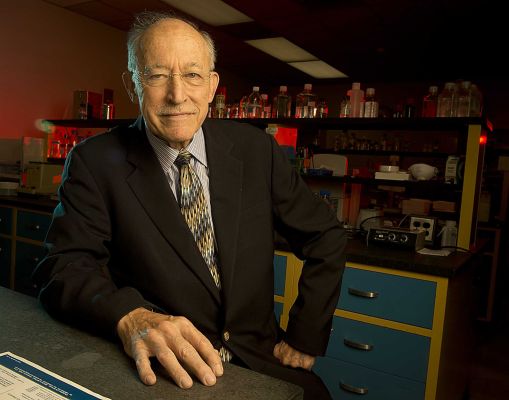Dr. Arthur P. Grollman, Distinguished Professor of Pharmacological Sciences, Evelyn G. Glick Professor of Experimental Medicine, and Director of the Zickler Laboratory of Chemical Biology at Stony Brook University School of Medicine—In 1974, Arthur P. Grollman was appointed Chairman (founding) of the Department of Pharmacological Sciences. Under his leadership, Pharmacological Sciences consistently ranked among the top Departments of Pharmacology in the United States.
 A distinguished figure in the field of medicine and a revered scholar, Dr. Grollman’s journey has been one of relentless curiosity, groundbreaking discoveries, and a steadfast commitment to advancing the frontiers of medical science. His academic journey began at the University of California at Berkeley, where he earned his Bachelor of Arts in Chemistry in 1955. In 1959, Dr. Grollman graduated from Johns Hopkins University School of Medicine, earning his Doctor of Medicine degree. Following internship and residency in Internal Medicine at Johns Hopkins, he conducted research at the National Institutes of Health. He then joined the faculty of the Albert Einstein College of Medicine, Bronx, N.Y., where he became Professor of Medicine, Pharmacology and Molecular Biology. He served concurrently as Associate Dean for Scientific Affairs at Albert Einstein from 1970 to 1973.
A distinguished figure in the field of medicine and a revered scholar, Dr. Grollman’s journey has been one of relentless curiosity, groundbreaking discoveries, and a steadfast commitment to advancing the frontiers of medical science. His academic journey began at the University of California at Berkeley, where he earned his Bachelor of Arts in Chemistry in 1955. In 1959, Dr. Grollman graduated from Johns Hopkins University School of Medicine, earning his Doctor of Medicine degree. Following internship and residency in Internal Medicine at Johns Hopkins, he conducted research at the National Institutes of Health. He then joined the faculty of the Albert Einstein College of Medicine, Bronx, N.Y., where he became Professor of Medicine, Pharmacology and Molecular Biology. He served concurrently as Associate Dean for Scientific Affairs at Albert Einstein from 1970 to 1973.
In 1974, Dr. Grollman was appointed Professor & Chair of Pharmacological Sciences at Stony Brook University’s nascent School of Medicine. Under his leadership, the Department of Pharmacological Sciences flourished, attracting top-tier faculty and students dedicated to advancing medical knowledge. His stewardship extended beyond the laboratory as well, particularly as Associate Dean for Scientific Affairs, 1994-1996, and he played a pivotal role in shaping the direction of medical research and education at the University.
Throughout his notable career, Dr. Grollman published more than 200 papers in the fields of molecular biology and cancer research. His more recent research interests focused on the biological consequences of DNA damage as they relate to molecular mechanisms of DNA replication, mutagenesis, and DNA repair. Research in the Grollman laboratory was instrumental in establishing the mechanism of action of the antitumor agent bleomycin and in defining the biochemical pathway that protects cells against mutations produced by oxidative DNA damage. Subsequently, he and colleagues established the three-dimensional structures of DNA glycosylases and DNA polymerases bound to site-specifically modified DNA, thereby correlating the molecular structure of damaged DNA with biologic function. He also directed a research program focusing on the environmental and genetic causes of endemic (Balkan) nephropathy and its associated urothelial cancer.
Dr. Grollman was a recognized expert on the clinical pharmacology of herbal medicines and testified on this subject before the White House Commission on Alternative and Complementary Health Policy, the Senate Subcommittee on Commerce, Science and Transportation (Sen. John McCain, Chair), and Governor George Pataki’s Task Force on Life and Law.
He held Visiting Professorships at Stanford University, Johns Hopkins School of Medicine, the University of California at San Francisco, the National Cancer Research Center (Japan), the Hebrew University (Israel), the Weizmann Institute (also Israel), and the University of Washington.
Dr. Grollman served on numerous scientific advisory committees and editorial boards, including the Environmental Health Sciences Review Committee of the National Institute of Environmental Health Sciences. In recognition of his pioneering scientific contributions, Dr. Grollman received numerous accolades and awards throughout his career including an American Cancer Society Scholarship Award, and a MERIT award from the National Cancer Institute, among many others. Notably, in 2011, the Environmental Mutagen Society conferred its prestigious annual recognition award to Dr. Grollman for his outstanding research contributions in the area of environmental mutagenesis which alerted scientists to the ongoing public health concern of aristolochic acid-induced nephropathy and urothelial cancer. Furthermore, the award recognized Dr. Grollman’s landmark contributions to the understanding of the molecular mechanisms by which DNA repair proteins, including DNA glycosylases, DNA polymerases, and endonucleases, process oxidative DNA damage.
In 2003, his work earned him the designation of Distinguished Professor of Pharmacological Sciences at Stony Brook University, a testament to the impact of his research and leadership. Beyond his research accomplishments, Dr. Grollman’s influence can be felt through the countless students and researchers he has mentored during his career. His commitment to nurturing the next generation of scientists and physicians will leave an enduring legacy at Stony Brook University.
Donations in Dr. Grollman's honor can be made to the Graduate Program in Molecular and Cellular Pharmacology at Stony Brook University; where his impact will continue to be felt for generations to come.

